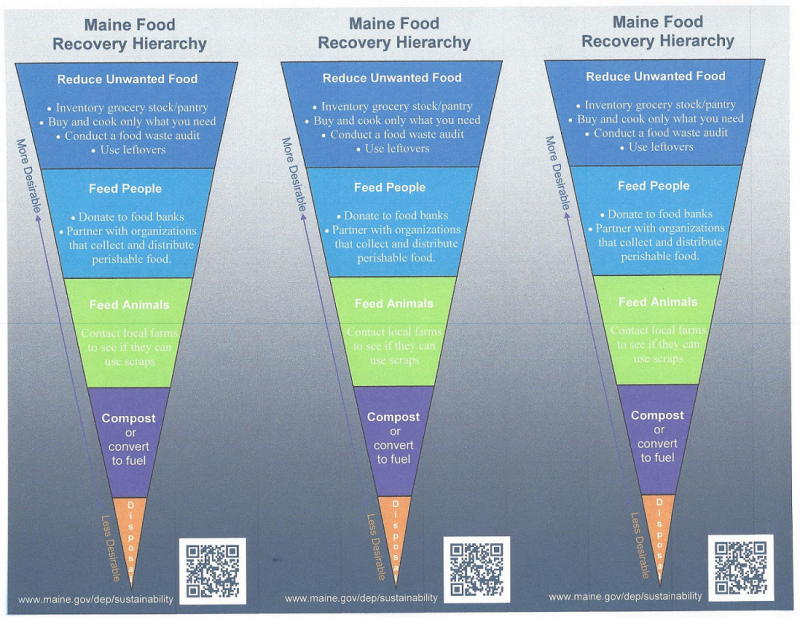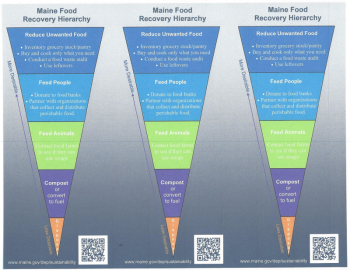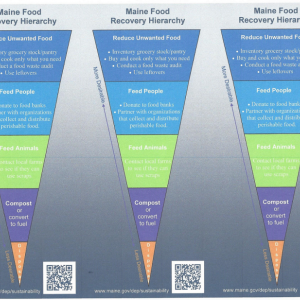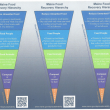Mitchell Center to host food waste solutions summit, April 9
The Senator George J. Mitchell Center for Sustainability Solutions at the University of Maine will host the first annual Maine Food Waste Solutions Summit, Friday, April 9, from 10 a.m. to 1 p.m., to build awareness of the growing food waste problem and to share solutions that promote economic development, address hunger and improve natural resource management in Maine.
The U.S. Department of Agriculture reports that nearly 40% of all food produced in the U.S. is never eaten. Mainers waste 280 million pounds of food annually, yet according to Feeding America, 200,000 of neighbors suffer from food insecurity.
This free virtual forum seeks to find collaborative solutions to these problems by supporting businesses, organizations and communities working to develop sustainable strategies that address food waste with creative recovery and recycling solutions.
Invited presenters include Angel Valez from Rethink Food Waste through Economics and Data (ReFED), a national nonprofit focused on ending food loss and waste by advancing data-driven solutions, and U.S. Rep. Chellie Pingree, a national leader in supporting bipartisan legislation to end food waste. Valez will provide an overview of the problem by sharing the latest research and statistics on food waste in Maine; Pingree will outline federal legislative initiatives aimed at addressing the problem.
A panel featuring Maine food system leaders from Sodexo, Good Shepherd Food Bank, Maine Grains and Skowhegan Public Works will highlight local organizations’ innovative food waste solutions. In addition, Mitchell Center student interns will share new education initiatives being piloted to enhance awareness of the problem, and to empower more Maine organizations and communities to take action to end food waste and hunger.
At noon, student interns will facilitate planning by attendees seeking to initiate beneficial programs within their communities or organizations in optional “Take Action” break-out sessions that will highlight potential projects, such as tracking and measuring to reduce food waste, increasing food donation and food rescue, starting a community collection food recycling program or exploring processing of agricultural surplus.
The summit is funded, in part, by a Maine Department of Environmental Protection (DEP) food waste diversion grant.
“The summit education aligns very closely with our goals and interests regarding food rescue and reuse towards higher and better end uses,” said Mark King, Maine DEP Organics specialist, in a Center news release.
To register and receive the Zoom link, or to request a reasonable accommodation, contact Susanne Lee, faculty fellow at the Senator George J. Mitchell Center for Sustainability Solutions; susanne.lee@maine.edu.
About the University of Maine:
The University of Maine, founded in Orono in 1865, is the state's land grant, sea grant and space grant university. It is located on Marsh Island in the homeland of the Penobscot Nation. As Maine's flagship public university, UMaine has a statewide mission of teaching, research and economic development, and community service. UMaine is the state's only public research university and among the most comprehensive higher education institutions in the Northeast. It attracts students from all 50 states and more than 75 countries. UMaine currently enrolls 11,741 undergraduate and graduate students who have opportunities to participate in groundbreaking research with world-class scholars. UMaine offers more than 100 degree programs through which students can earn master's, doctoral or professional science master's degrees, as well as graduate certificates. The university promotes environmental stewardship, with substantial efforts campuswide to conserve energy, recycle and adhere to green building standards in new construction. For more information about UMaine, visit umaine.edu.
Event Date
Address
United States
























